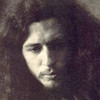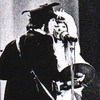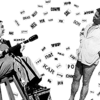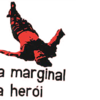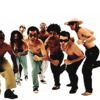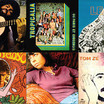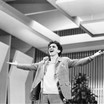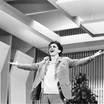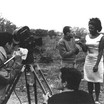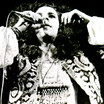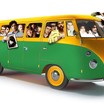Ilumencarnados seres
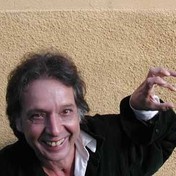
arnaldo baptista
Interviews
Ana de Oliveira – How was the experience of meeting Caetano e Gil? What drove you to them?
Arnaldo Baptista – Caetano didn’t influence me as much as Gil did. With Gil we rehearsed more. We could make the bass gain a higher status in the music. So our music started to seem more electric. Actually, the guitar was always present in music. What changed was the bass that the Beatles and the Rolling Stones created, those heavy boxes… We did not put the guitar, but the bass into music.
Ana de Oliveira – How did you, a rock musician, feel playing “Domingo no Parque,” a capoeira song?
Arnaldo Baptista – It may seem odd, but we did know Brazilian music, especially samba, and we didn’t compose too much. When we saw Gil making those chord-shapes in the guitar, then we gave continuity to our creation through Bahians, Aztecs, Incas, Mayas… we had more to do with the Northeast. The people from São Paulo were too European. Caetano and Gil showed us a more comprehensive side, the South America. This way, little by little we could start composing. It was also strange to play with Rogério Duprat’s orchestra.
Ana de Oliveira – What is the basic difference between the Tropicalista Mutantes and the Post- Tropicália Mutantes?
Arnaldo Baptista – Rita Lee has American parents, we spoke English a lot in the songs. But with Tropicália, the Mutantes got much more Brazilian. Because, before it, we listened to the radio, but we had nowhere to hang – in order to compose. It is a sort of virgin forest, and we went there and saw it. We started, then, to understand better what put things forward.
Ana de Oliveira – What do you think about the interest Americans have been having in the last few years towards the Mutantes?
Arnaldo Baptista – At that time, we might have represented a very American side of the Brazilian music. With Gil, we mixed everything. The Americans learnt that from us, they came together. We might be the interpreters between the American culture and the very Bahian Tropicália.
Ana de Oliveira – The 60’s were a period of political and aesthetic power confrontations. Did you cultivate enemies by participating in the Tropicália?
Arnaldo Baptista – Coming to think of it, no. Daddy was a politician. But I never got deeply involved with politics or music. I don’t remember anything.
Ana de Oliveira – At the International Song Festival, during the performance of “É Proibido Proibir,” the audience was booing and throwing things on you. How did you feel?
Arnaldo Baptista – Caetano said: “Is this the youth who wants to dominate the country?” That touched me. It was difficult because I had a gap, I did not understand what Caetano thought, politically speaking. Caetano had an instrumental gap, bass, drum, rock’n’roll. So, we completed each-other. It was an adventure to me, myself, stage, Caetano and audience.
Ana de Oliveira – Were you afraid?
Arnaldo Baptista – No. We step on stage and change. I let myself be carried away and each time something different would happen. I liked it.





